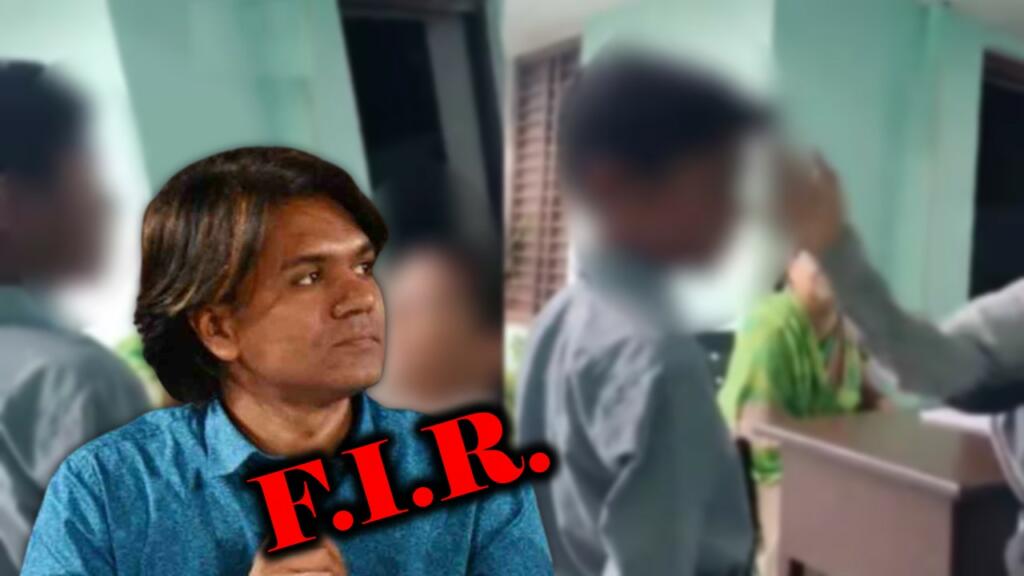Mohammad Zubair, known for his biased journalism and tendency to stir up hate, is making headlines once again, but for all the wrong reasons. On August 28th, Uttar Pradesh Police charged Mohammed Zubair, co-founder of Alt News, under the Juvenile Justice Act’s Section 74. His offense: revealing the details of the minor victim in the much talked about Muzaffarnagar case.
This legal action came after a complaint was filed on the same day. This isn’t the first time Zubair finds himself in trouble. His habit of sharing fake stories has led to similar incidents in the past. This situation highlights the serious consequences of spreading misinformation and emphasizes the growing role of legal measures to tackle it.
The complaint lodged against Mohammad Zubair alleges that he shared a video on social media that exposed the identity of a minor, a violation of the safeguards accorded to minors under the Juvenile Justice Act. The complaint, explicitly outlining the incident, reads, “I encountered a video on the 25th of August related to an occurrence at Neha Public School Khubbapur, shared by Alt News journalist Mohammed Zubair. The video divulged the minor’s identity, contravening the rights safeguarded for minors under the Juvenile Justice Act.” The complainant urged the police to take resolute action against Zubair in response.
An FIR has been registered against alleged fact- checker Mohammad Zubair in Uttar Pradesh.
He is accused of sharing a video from Muzaffarnagar that revealed the identity of a victimized child.#TriptaTyagi case pic.twitter.com/DxTdrxLHgJ
— Megh Updates 🚨™ (@MeghUpdates) August 28, 2023
Also read: Tripta Tyagi case: The truth behind the Muzaffarnagar incident
Merely days prior to this incident, on August 25th, Priyank Kanoongo, the head of the National Commission for Protection of Child Rights (NCPCR), exhorted the public to abstain from sharing the video. Kanoongo addressed the matter, asserting, “In Muzaffarnagar, Uttar Pradesh, a situation surfaced involving a teacher compelling other students to assault a child in the classroom. In light of this, instructions for appropriate action are being issued. It is earnestly requested that the video of the minor not be disseminated. Instead, information regarding such incidents should be communicated via email. Becoming an accessory to the crime by revealing the identities of the children should be avoided.”
उत्तरप्रदेश के मुज़फ़्फ़रनगर में एक शिक्षिका द्वारा कक्षा में बच्चे को अन्य बच्चों से पिटवाये जाने की घटना की जानकारी मिली है।
संज्ञान ले कर कार्यवाही हेतु निर्देश जारी किए जा रहे हैं,सभी से निवेदन है कि बच्चे का वीडियो शेयर न करें इस तरह की घटना की जानकारी ईमेल द्वारा दें,बच्चों…— प्रियंक कानूनगो Priyank Kanoongo (मोदी का परिवार) (@KanoongoPriyank) August 25, 2023
However, the focus returns to Mohammad Zubair, a figure whose track record is stained with allegations of agenda-driven journalism that reportedly resulted in fatalities and endangered numerous lives. Notably, he gained notoriety for propagating fabricated news against former BJP spokesperson Nupur Sharma, triggering protests and severe acts of violence under the guise of protecting religious sentiments. Zubair’s legal standing is precarious, having secured bail in relation to two cases, one of which is filed under the Protection of Children from Sexual Offences (POCSO) Act, a record not conducive to pride.
This instance is far from the first occasion when Mohammad Zubair has faced legal repercussions. The preceding year saw his arrest by the Delhi Police and Uttar Pradesh Police for his alleged involvement in multiple cases following a series of extremist murders. Despite compelling evidence suggesting his involvement, Zubair was released on bail, a move attributed to the then-incumbent Chief Justice of India, DY Chandrachud. Nevertheless, such events warrant separate discussion.
Turning back to 2021, Zubair’s disingenuous coverage of the Loni altercation elicited strong responses from both the government and the judiciary. Figures such as Mohammad Zubair and Rana Ayyub found themselves compelled to issue written apologies in response to their disseminated propaganda.
The allegations against Mohammad Zubair for revealing the identity of a minor in the shared video have once again brought his contentious history of journalism to the forefront. The clash between his media activities and legal consequences underscores the intricate interplay between freedom of expression and the responsible dissemination of information.
Support TFI:
Support us to strengthen the ‘Right’ ideology of cultural nationalism by purchasing the best quality garments from TFI-STORE.COM
